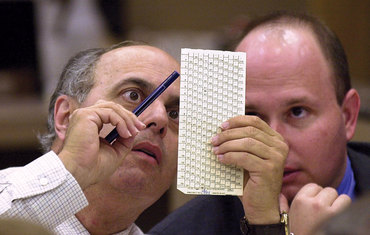Voter suppression in action
 The clowder of legislation to restrict voting access that's popping up across the US is casting the last 20 years of debate over online voting in a new light.
The clowder of legislation to restrict voting access that's popping up across the US is casting the last 20 years of debate over online voting in a new light.
For anyone who, like me, has never spent more than a few minutes casting their vote, the scenes from the 2020 US election were astounding. In response to a photo of a six-*hour* line of waiting voters, someone on Twitter observed, "That is democracy in action." Almost immediately a riposte: "That is voter suppression in action."
I had no idea of the tactics of voter suppression until the 2008 Computers, Freedom, and Privacy conference, when Lillie Coney led a panel on updates to deceptive election practices. Among those Coney and Tova Wang listed were robocalls advising Democrats and Republicans to vote on different days (one the real election day, one not) or saying that the polling location had changed and letters sent to Latino names threatening deportation if they voted illegally. Crude tactics, but effective, especially among new voters. Coney and Wang imagined these shifting to much better-targeted email and phony websites. It was too soon for anyone to spot two-year-old Facebook as the eventual vector.
By 2020, voter suppression was much more blatant. Republicans planted fake drop boxes in California; Texas selectively closed polling places, especially those in central locations easily accessed by public transport; and everywhere Donald Trump insisted that mail-in ballots meant fraud. Nonetheless, even Fox News admitted that the 2020 election was the most secure in US history and there's no evidence of fraud in any jurisdiction. The ability to audit and recount, not just read a number off an electronic counter, is crucial to being able to say this.
It now appears that this election was just a warm-up. The Brennan Center is currently tracking 253 bills that restrict voting access in 43 states, and 704 bills with provisions to expand it in a different set of 43 states. Sometimes both approaches coexist in the same bill. Outside the scope of legislation, later this year congressional districts will be redrawn based on the 2020 census, another process that can be gamed. At the federal level, Democrats are pushing the passage of H.R.1, the For the People Act, to reform many aspects of the US electoral system including financing, districting, and ethics. One section of the bill provides grants to update voting systems, creates security requirements for private companies that sell voting machines and election equipment, and requires those companies to report cybersecurity incidents. Citizens for Ethics supplies the sources of the ideas enshrined in the act. For even more, see Democracy Docket, whose founder, Marc Elias, has been fighting the legal cases with a remarkable record of success. Ensuring fairness is not specifically about Republicans; historically both parties have gamed the system to hang onto power when they've had the chance.
Ever since 1999, when Bill Clinton asked the National Science Foundation to look into online voting, the stated reasons have always *sounded* reasonable - basically, to increase turnout by improving convenience. In the UK, this argument was taken up by the now-defunct organization Webroots Democracy, which argued that it could improve access for younger people used to doing everything on their phones, and would especially grant better access for groups such as visually impaired people who are not well provided for under the present system. These problems still need to be solved.
The reasons against adopting online voting haven't changed since 2000, when Rebecca Mercuri first outlined the security problems. In the UK very little has changed since 2007, when a couple of pilots led the Electoral Commission to advise against pursuing the idea for sound reasons. Tl;dr: computer scientists prefer pencils.
In 2016, to celebrate its second anniversary, Webroots founder Areeq Chowdhury said national adoption in the UK was achievable by the "next general election", then expected in 2020. He had some reason to believe this; in 2015 then Speaker of the House John Bercow suggested online voting should be used for the 2020 election. But, oh, timing! Chowdhury could have no idea that a month after that Webroots meeting the UK was going to vote (using paper and pencils) to leave the EU. In the resulting change in the political climate, two general elections have passed, in 2017 and 2019, both conducted using pencils and paper. So will May's delayed London mayoral election. The government's 2019 plan tobring in mandatory photographic voter ID by 2023 will diminish, not increase, access.
In the US, only 55.7% of eligible voters participated in the 2016 election, and the turnout for congressional primaries can be as low as 11%. Again, time changed everything: between 2000 and 2016 it seemed as though turnout would go on dropping. Then came 2020. Loving or hating incumbent Donald Trump broke records: 66.3% of eligible voters cast ballots, the highest percentage since 1900. That result bears out what many have said: turnout depends on voters believing that their vote matters.
The aggregate picture suggests that the appeal of online voting may have been to encourage the kinds of voters politicians wanted at a time when it was mostly younger, affluent, and educated people who had smartphones and Internet access. Follow the self-interest.
Illustrations: Officials recount a ballot in the narrow Bush-Gore 2000 election.
Wendy M. Grossman is the 2013 winner of the Enigma Award. Her Web site has an extensive archive of her books, articles, and music, and an archive of earlier columns in this series. Stories about the border wars between cyberspace and real life are posted occasionally during the week at the net.wars Pinboard - or follow on Twitter.